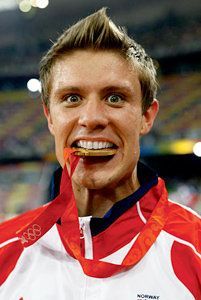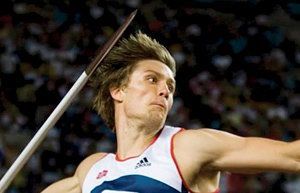When sports chiropractors first appeared at the Olympic Games in the 1980s, it was alongside individual athletes who had experienced the benefits of chiropractic care in their training and recovery processes at home. Fast forward to Paris 2024, where chiropractic care was available in the polyclinic for all athletes, and the attitude has now evolved to recognize that “every athlete deserves access to sports chiropractic."
Functional Neurology and Elite Athletes
World-class athletes face enormous pressures to excel in competition. The training necessary to compete at the elite level is intense and may put health and athletic careers at risk. The desire to improve physical performance and the outright ban of performance-enhancing drugs has brought chiropractic applications to the forefront for many world-class athletes. Chiropractic, the world's largest drug-free health care profession, has become a mainstream choice for many elite competitors in a variety of sporting events.
Excelling in sports at all levels is dependent not only on physical strength and ability, but also on brain function. Athletes need to be sharp, and any condition off the field that affects the brain and nerves can hinder an athlete's ability to perform at their best. The nature of sports makes athletes more prone than others to problems with the brain and nervous system. These competitors can suffer from repetitive-use nerve injuries, concussions, sleep problems and a variety of movement disorders that impact posture, gait and manual skills.
Increasing Performance Without Drugs
Many of the all-too-common treatments utilized for these conditions involve banned substances or substances that might be banned in the near future. Athletes need to be able to learn new skills and refine old ones in order to increase their performance and reduce the probability of injury without the use of drugs or surgery. Functional neurological applications utilizing nonpharmaceutical, brain-based approaches to patient care have provided a vehicle by which athletes might embrace higher levels of quality performance. Functional neurology is central to the American Chiropractic Association's Council on Neurology Diplomate in Neurology program and has received worldwide attention.
Council member Frederick Carrick, DC, PhD, and colleagues, demonstrated a relationship between posturographic sway fatigue and adaptability and the ability of elite gymnasts to learn new gymnastic routines.1 The study, published in the prestigious Journal of Disability and Rehabilitation, was specific to improving gymnastic performance while reducing the probability of injury. Carrick, et al., found that gymnasts whose stability adaptability scores were higher were able to learn and perform new motor routines better than those with lower adaptability scores or high fatigability ratios of stability. The study authors developed methodology to identify individuals whose ability to perform new motor activities might be impaired, and suggested applications that would improve function and motor learning skills.

This functional neurological approach to patient care addresses the integrity of the nervous system with applications to increase body function. Chiropractic neurologists utilize traditional clinicopathological testing in their diagnostic approach to the nervous system. In addition to identifying pathology, they develop applications that enhance and maximize the functionality of the system, utilizing natural modalities of light, sound, joint manipulation, exercise and cognitive training. By identifying differences between the activities in both sides of the brain, chiropractic neurologists direct their therapy to increase activation of the non-dominant side.
This approach has resulted in the discipline of chiropractic neurology receiving the first accreditation by the National Commission of Accreditation Agencies (NCCA), paving the way for a greater and more global acceptance of chiropractic. An additional three years of accredited clinical training past the DC degree is necessary to qualify as eligible for board certification in neurology.
An Olympic Success Story
General-practice chiropractors might wonder if specialist training makes a difference in their treatment of athletes. Norway's Andreas Thorkildsen says it does; in fact, he attributes his gold-medal success to his chiropractic neurologist, Dr. Kasper Andresen Sr., of Oslo, Norway, and praised him in a world broadcast interview immediately following his win in Beijing last year.
According to the two-time Olympic gold medalist (javelin), Dr. Andresen was a natural person to mention and give credit for his recent win: "Dr. Andresen has been a miracle for me over the last two years, and has always been there when things where not working. I felt that I was not in line ... off balance ... could not get the right touch. ... Kasper fixed that, and [for] the last year I have seen him more or less for a prevention-type of functional neurological treatment. I am also attended [to] by different physiotherapists and physicians, but the functional neurology is very special to me."
In 2006, Thorkildsen's ability to participate at a world-class level in athletic competitions was severely compromised with a variety of severe and chronic problems that were treated without success by many health care professionals. He was referred to Dr. Andresen for a consultation in functional neurology and underwent chiropractic treatment utilizing brain-based applications.

At the Beijing Games, Thorkildsen set an Olympic record of 90.57 meters in the javelin throw, finishing nearly 4 meters ahead of his nearest rival. His winning throw in less-than-ideal conditions came in the fifth round, but Thorkildsen dominated the event from the start. He cemented his position as the world's top javelin thrower with a 90.28-meter effort at the AF Golden League competition in Zurich later in the year. No other thrower in the world had gone over the 90-meter barrier the entire year. Thorkildsen's successful defense of his gold medal in Beijing was instrumental in his selection as the male Waterford Crystal European Athlete of the Year for 2008.
Even with two Olympic gold medals and a victory at the 2006 European Athletics Championships, Thorkildsen believes he can improve his performance with the help of Dr. Andresen and his coach, Asmund Martinsen. "I do not need to see Dr. Andresen that often. He has taught me to look for some signals from my body that tells me it's time for a treatment. I am so fine-tuned in my training that a small dysfunction will give me big problems. Within the technical sports, there is a great need for a functional neurology approach. It allows athletes to get in better shape and prevents them from getting hurt. I recommend all my colleagues to see a chiropractic neurologist, and most do."
Chiropractic Neurology in Action
Dr. Kasper Andresen is a native of Norway and a 1976 graduate of Palmer College of Chiropractic. While at Palmer, he attended Gonstead seminars and became proficient in that chiropractic technique. He was awarded a position to work directly with Dr. Clarence Gonstead for six months after his graduation, then returned to his native Norway and opened a practice in Oslo. He recalls the days with Dr. Gonstead as one of the greatest experiences in his life.
After 18 years in practice, Dr. Andresen started his training in functional neurology with the Carrick Institute and was introduced to Dr. Ted Carrick, who was to become his second mentor. "He changed my chiropractic thinking and made me see the wonderful world of functional neurology," said Dr. Andresen. "My practice was very successful before neurology, yet this training changed my ability to serve humankind completely. I learned to treat patients with less treatments and better outcomes than I had ever dreamed of."
Dr. Andresen had extensive experience treating world-class athletes even before completing his graduate training in neurology with the Carrick Institute. He has been a doctor for many world-class athletes, including the Swiss downhill team from 1982-86, and was instrumental in helping one of his patients win the gold medal in the giant slalom in Sarajevo in 1984. According to Dr. Andresen, "Chiropractic applications have always enabled me to serve my patient population in a superior manner, but the functional neurological approach allows me to obtain better and more lasting results in a shorter period of time."
Kasper Andresen is joined by his son, Kasper Jr., at his clinic in Oslo. Kasper Jr., also a graduate of Palmer and the Carrick Institute, represents an exciting future generation of functional neurologists. Kasper Sr. appreciates his son's ability to integrate into mainstream health care because of his early training in neurology. As a consequence, the Andresens' clinic, Kaklinikken, enjoys referrals of a variety of neurological specialty cases, from young children to the elderly.
As well as attending to Thorkildsen and other patients with disturbances of motor learning, the Andresens have a special interest in cognitive development and learning. Their clinic has obtained national attention in Norway for its work with children suffering from ADD, ADHD, Tourette's syndrome, autism and Asperger's syndrome. Their utilization of a functional neurological approach in these cases has proven successful.
Dr. Andresen Sr. recommends that all chiropractors embrace graduate school studies in neurology, regardless of how long they have been in practice or what techniques they might use: "The application of a functional neurological approach to patient care is associated with a superior outcome. This is the basis of all that we might do in our service to humankind."
Andreas Thorkildsen says he owes his gold medal success to his chiropractic neurologist, Dr. Kasper Andresen, and it is easy to understand why.
Reference
- Carrick FR, Oggero E, Pagnacco G, Brock JB, Arikan T. Posturographic testing and motor learning predictability in gymnasts. Disabil Rehabil, Dec. 30, 2007;29(24):1881-9.


